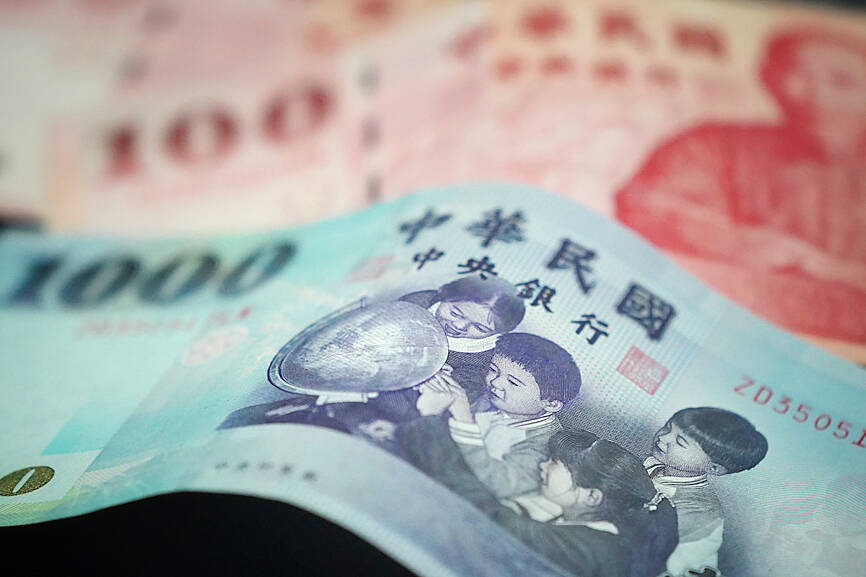Taiwan is expected to report record excess savings of almost NT$4.8 trillion (US$159 billion) this year, thanks to a rapidly expanding current account surplus amid strong global demand for artificial intelligence (AI) applications, Directorate-General of Budget, Accounting and Statistics (DGBAS) data showed.
The DGBAS data showed that excess savings are estimated to reach NT$4.79 trillion this year, up from NT$3.95 trillion last year, as exporters continue to benefit from strong global demand for emerging technologies.
Taiwan’s excess savings breached the NT$3 trillion mark for the first time in 2020, hitting NT$3.17 trillion, and that growth accelerated in the following years, the DGBAS said, adding that the figure is likely to grow to about NT$5.1 trillion next year.

Photo: CNA
Excess savings refers to the difference between a nation’s gross domestic savings and gross domestic investments, and serves as an indicator of idle funds. Whenever excess savings increase, a nation is sitting on more idle money.
DGBAS Department of Statistics head Tsai Yu-tai (蔡鈺泰) said Taiwan is an export-oriented economy and enjoys a current account surplus, which mainly measures exports and imports of a nation’s merchandise and services, so it is no surprise excess savings are growing.
Given the AI boom, in particular, Tsai said Taiwan’s excess savings are likely to continue to grow this year and next year.
Taiwan’s exports of merchandise and services are expected to soar 23.74 percent this year with a trade surplus of US$140.2 billion. Outbound sales are set to grow an additional 2.01 percent next year, increasing the trade surplus to US$150.9 billion, the DGBAS said.
Despite increasing excess savings, the DGBAS said Taiwan’s investment rate, which is the ratio of investment to GDP, is expected to remain at 26.27 percent this year and 26.62 percent next year.
Although the DGBAS appeared upbeat that global demand for AI products would continue to push up exports and investments, National Central University Research Center for Taiwan Economic Development director Dachrahn Wu (吳大任) said he remains cautious as the US job market has shown signs of slowing and inflation could accelerate in the second half of this year due to US President Donald Trump’s tariffs.
With the US economy, the world’s largest, showing signs of weakening, Wu expressed concern about global demand for AI applications, and the possible impact on Taiwan’s exports and economic growth.
In addition, as the US is using its tariff policies to force Taiwanese manufacturers to invest in the US market, the local manufacturing sector could scale back its investments in Taiwan, compromising the nation’s investment growth, he said.

Right-wing political scientist Laura Fernandez on Sunday won Costa Rica’s presidential election by a landslide, after promising to crack down on rising violence linked to the cocaine trade. Fernandez’s nearest rival, economist Alvaro Ramos, conceded defeat as results showed the ruling party far exceeding the threshold of 40 percent needed to avoid a runoff. With 94 percent of polling stations counted, the political heir of outgoing Costa Rican President Rodrigo Chaves had captured 48.3 percent of the vote compared with Ramos’ 33.4 percent, the Supreme Electoral Tribunal said. As soon as the first results were announced, members of Fernandez’s Sovereign People’s Party

MORE RESPONSIBILITY: Draftees would be expected to fight alongside professional soldiers, likely requiring the transformation of some training brigades into combat units The armed forces are to start incorporating new conscripts into combined arms brigades this year to enhance combat readiness, the Executive Yuan’s latest policy report said. The new policy would affect Taiwanese men entering the military for their compulsory service, which was extended to one year under reforms by then-president Tsai Ing-wen (蔡英文) in 2022. The conscripts would be trained to operate machine guns, uncrewed aerial vehicles, anti-tank guided missile launchers and Stinger air defense systems, the report said, adding that the basic training would be lengthened to eight weeks. After basic training, conscripts would be sorted into infantry battalions that would take

GROWING AMBITIONS: The scale and tempo of the operations show that the Strait has become the core theater for China to expand its security interests, the report said Chinese military aircraft incursions around Taiwan have surged nearly 15-fold over the past five years, according to a report released yesterday by the Democratic Progressive Party’s (DPP) Department of China Affairs. Sorties in the Taiwan Strait were previously irregular, totaling 380 in 2020, but have since evolved into routine operations, the report showed. “This demonstrates that the Taiwan Strait has become both the starting point and testing ground for Beijing’s expansionist ambitions,” it said. Driven by military expansionism, China is systematically pursuing actions aimed at altering the regional “status quo,” the department said, adding that Taiwan represents the most critical link in China’s

‘REALLY PROUD’: Nvidia would not be possible without Taiwan, Huang said, adding that TSMC would be increasing its capacity by 100 percent Nvidia Corp CEO Jensen Huang (黃仁勳) on Saturday praised and lightly cajoled his major Taiwanese suppliers to produce more to help power strong demand for artificial intelligence (AI), capping a visit to the country of his birth, where he has been mobbed by adoring fans at every step. Speaking at an impromptu press conference in the rain outside a Taipei restaurant, where he had hosted suppliers for a “trillion-dollar dinner,” named after the market capitalization of those firms attending, Huang said this would be another good year for business. “TSMC needs to work very hard this year because I need a lot